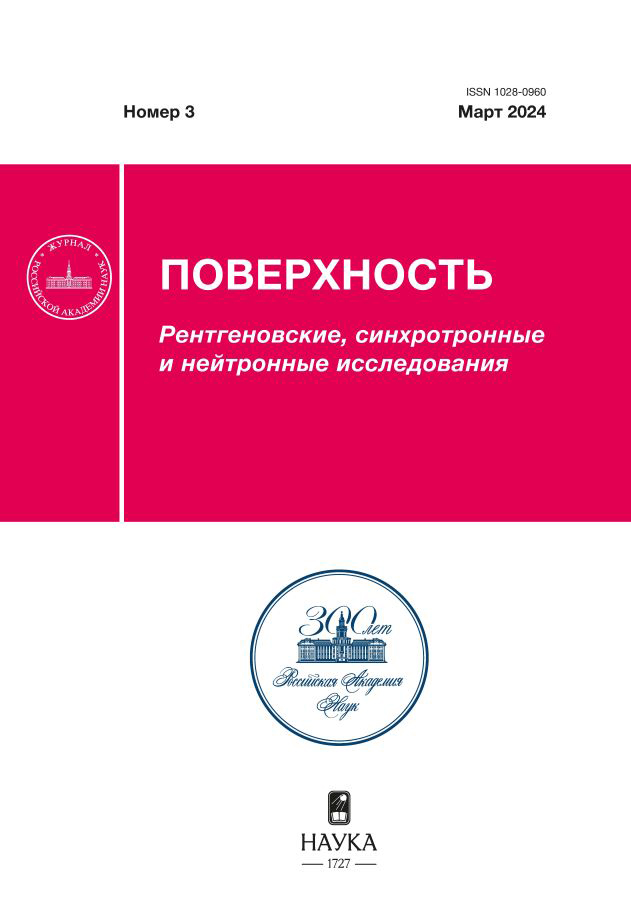Comparison of optical properties and radiation stability of Gd2O3 micro- and nanopowders
- Авторлар: Mikhailov M.M.1, Goronchko V.A.1, Fedosov D.S.1, Lapin A.N.1, Yuryev S.A.1
-
Мекемелер:
- Tomsk State University of Control Systems & Radioelectronics
- Шығарылым: № 3 (2024)
- Беттер: 44-50
- Бөлім: Articles
- URL: https://gynecology.orscience.ru/1028-0960/article/view/664671
- DOI: https://doi.org/10.31857/S1028096024030079
- EDN: https://elibrary.ru/hfmkgx
- ID: 664671
Дәйексөз келтіру
Аннотация
The results of comparative studies of the phase composition, diffuse reflectance spectra, radiation-induced absorption spectra, and the integral absorption coefficient of solar radiation upon irradiation of micro- and nanopowders of gadolinium oxide are presented. To assess the radiation resistance of optical properties, the samples were placed in a chamber of an installation simulating space conditions, where diffuse reflection spectra were recorded in the range of 0.2–2.5 μm in a vacuum of 2×10–6 Torr before and after each period of electron irradiation (E = 30 keV, Φ = (1 – 3)×1016 cm–2). Micropowders of rare earth elements are used to increase the radiation stability of materials by absorbing free electrons formed in them during irradiation during their transitions from the d- to f-shell. Nanopowders of rare earth elements added to micropowders of various compounds provide an additional mechanism for increasing radiation stability due to the annihilation of primary defects formed during irradiation on nanoparticles. The work obtained a result opposite to these mechanisms - the radiation stability of micropowder is significantly (more than 4 times) higher compared to nanopowder, due to more intense absorption in the ultraviolet region for nanopowder, caused by its own defects. The paper gives an explanation of the results obtained.
Негізгі сөздер
Толық мәтін
Авторлар туралы
M. Mikhailov
Tomsk State University of Control Systems & Radioelectronics
Хат алмасуға жауапты Автор.
Email: membrana2010@mail.ru
Ресей, 634000, Tomsk
V. Goronchko
Tomsk State University of Control Systems & Radioelectronics
Email: W_Goronchko@mail.ru
Ресей, 634000, Tomsk
D. Fedosov
Tomsk State University of Control Systems & Radioelectronics
Email: Membrana2010@mail.ru
Ресей, 634000, Tomsk
A. Lapin
Tomsk State University of Control Systems & Radioelectronics
Email: Membrana2010@mail.ru
Ресей, 634000, Tomsk
S. Yuryev
Tomsk State University of Control Systems & Radioelectronics
Email: Membrana2010@mail.ru
Ресей, 634000, Tomsk
Әдебиет тізімі
- Vani P., Vinitha G., Sayyed M.I., Alshammari M.M., Manikandan N. // Nucl. Engineer. Technol. 2021. V. 53. Iss. 12. P. 4106. https://doi.org/10.1016/j.net.2021.06.009
- Marzouk M.A., Ghoneim N.A. // Radiation Phys. Chem. 2020. V. 174. P. 108893. https://doi.org/10.1016/j.radphyschem.2020.108893
- Chen J., Yu Y., Feng A., Mi L., Xiu H. // Ceram. Int. 2022. V. 48. Iss. 1. P. 754. https://doi.org/10.1016/j.ceramint.2021.09.155
- Kleiman J.I., Gudimenko Y., Iskanderova Z., Tennyson R.C., Morison W.D. Modification of Thermal Control Paints by PHOTOSIL™ Technology. // Protection of Space Materials from the Space Environment. Space Technology Proceedings, vol 4. / Eds. Kleiman J.I., Tennyson R.C. Dordrecht: Springer, 2001. P. 243. https://doi.org/10.1007/978-94-010-0714-6_19
- Mikhailov M.M., Vlasov V.A., Yuryev S.A., Neshchimenko V.V., Shcherbina V.V. // Dyes and Pigments. 2015. V. 123. P. 72. https://doi.org/10.1016/j.dyepig. 2015.07.024
- Bo Z., Gang L., Kangli C., Weimin C. Preparation and Space Environmental Stability of a Nano-Materials Modified Thermal Control Coating. // Protection of Space Materials from the Space Environment. Space Technology Proceedings, vol 47. / Ed. Kleiman J.I. Cham: Springer, 2017. P. 433. https://doi.org/10.1007/978-3-319-19309-0_43
- Михайлов М.М., Нещименко В.В., Скрипка Н.Г., Хохлов Р.Н. // Перспективные материалы. 2010. № 3. C.14.
- Dudin A.N., Iurina V.Yu., Neshchimenko V.V., Li C.L. // St. Petersburg Polytechnic University Journal – Phys. Math. 2022. V. 15. Iss. 3.1. P. 259. https://doi.org/10.18721/JPM.153.117
- Andrievskii R. // Rev. Adv. Mater. Sci. 2011. V. 29.
- Kositsyn L.G., Mikhailov M.M., Kuznetsov N.Y., Dvoretskii M.I. // Instrum. Experimental Tech. 1985. V. 28. P. 929.
- Artini C., Costa G.A., Pani M., Lausi A. // J. Solid State Chem. 2012. V. 190. P. 24. https://doi.org/10.1016/j.jssc.2012.01.056
- ASTM E490-00a. Standard Solar Constant and Zero Air Mass Solar Spectral Irradiance Tables, ASTM International, West Conshohocken, PA, 2019.
- Mikhailov M.M., Dvoretskii M.I. // Soviet Phys. J. 1988. V. 31. P. 591. https://doi.org/10.1007/BF00917556
- Kuznetsov V.N., Serpone N. // J. Phys. Chem. 2009. V. 113. № 34. P. 15110. https://doi.org/10.1021/jp901034t
- Blanco M., Coello J., Iturriaga H., Maspoch S., Pezue-la C. // Analyst 1998. V. 123. Iss. 8. P. 135. https://doi.org/10.1039/A802531B
- Blanco M., Villarroya I. // Trends in Analytical Chemistry. 2002. V. 21. Iss. 4. P. 240. https://doi.org/10.1016/S0165-9936(02)00404-1
- Trofimova E., Pustovarov V., Zatsepin A. // Physics of the Solid State. 2019. V. 61. P. 763. https://doi.org/10.1134/S1063783419050366
- ASTM E903 – 96. Standard Test Method for Solar Absorptance, Reflectance, and Transmittance of Materials Using Integrating Spheres, ASTM International, West Conshohocken, PA, 2012.
- Johnson F.S. // J. Meteorological. 1954. V. 11. № 5. P. 431. https://doi.org/10.1175/1520-0469(1954)011<0431: TSC>2.0.CO;2
- Новиков Л.С. // Радиационные воздействия на материалы космических аппаратов. М.: Унив. книга, 2010. С. 191.
Қосымша файлдар
















